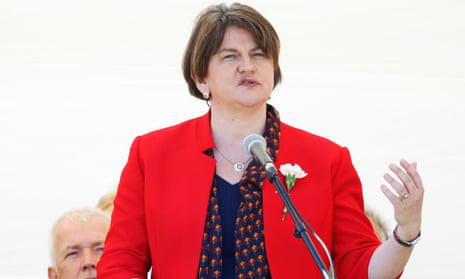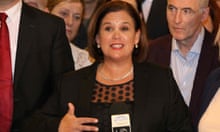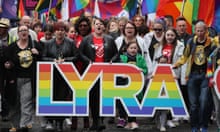Arlene Foster has indicated her Unionist party may be unable to block a gay marriage bill in Northern Ireland as she attended an Orange Order march in Scotland.
The Democratic Unionist party leader said her party did not have enough votes to veto laws supporting equal marriage in the province by tabling a so-called petition of concern at Stormont.
She said the DUP had only 28 votes while a petition of concern – a mechanism at Stormont designed to ensure legislation had cross-community support – needed 30 votes to be tabled.
Foster, who was first minister of Northern Ireland until the DUP’s power-sharing government with Sinn Fein collapsed last year, insisted she wanted to see greater tolerance and collaboration once power-sharing resumed at Stormont.
She was attacked by gay rights activists and Scottish National party politicians last year after it emerged she had written to ministers in Edinburgh in 2015 asking them to bar gay Northern Irish residents from converting civil partnerships to marriages in Scotland.
After the Irish republic voted overwhelmingly to back gay marriage in Ireland and Westminster politicians demanded the UK government impose reform on Northern Ireland, Foster has shifted ground.
She became the first DUP leader to attend an LGBTQ event in Belfast last week and insisted her party welcomes gay people. She suggested on Saturday the DUP’s objections to gay marriage would be dealt with by negotiation in Stormont when power-sharing restarted.
“We don’t have a majority [in Stormont] so even if we did apply that petition of concern there’s no guarantee that would actually go through,” Foster said. “So these are all issues we need to discuss in the [cross-party] talks and indeed in the devolved administration.”
Foster’s remarks came as she addressed about 5,000 Orange Order members from Scotland and Northern Ireland in Cowdenbeath before they marched through the town to commemorate the Battle of the Boyne, where the Dutch Protestant King William of Orange defeated the Catholic monarch King James VII of Scotland and II of England and Wales in 1690.
Formed in 1795 as a militantly Protestant body which has espoused vehement anti-Catholic, pro-unionist and pro-monarchist views, the Orange Order’s influence in Scotland has faded in recent years.
It claims about 50,000 Scottish members and also has seven acknowledged members serving as Labour and Tory councillors in central Scotland.
While not a Orange order member, Foster is the first female unionist leader to address an Orange rally in Scotland, but several other Unionist leaders have done so, including Peter Robinson and Jim Molyneaux. “This is my culture, this is who I am,” she said.
Disliked by many mainstream politicians for its sectarianism and the support shown for Loyalist paramilitaries among some of its supporters, it set up its own anti-independence campaign during the 2014 Scottish referendum after the official pro-UK campaign Better Together refused to include it in its events.
Foster insisted that modern Orangeism and unionism were inclusive and tolerant. She said her party’s widely derided proposals in 2015 to build a road bridge linking Scotland and Northern Ireland had much greater currency now the UK was leaving the EU.
“While others want to put up barriers post-Brexit, we want to see bridges built and we want to see that not only in terms of infrastructure but between communities as well.”










